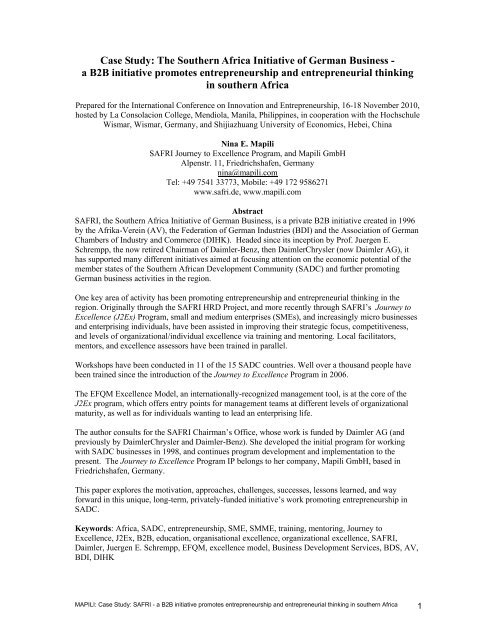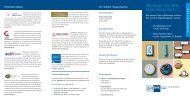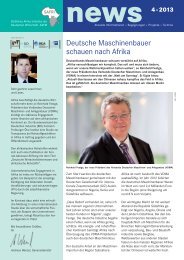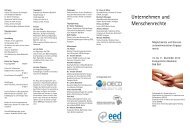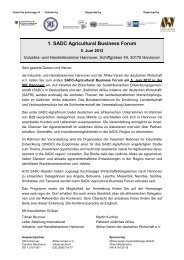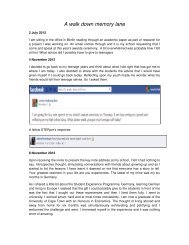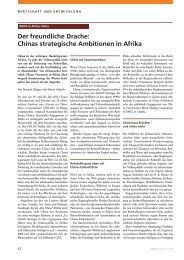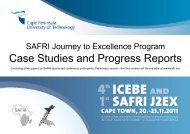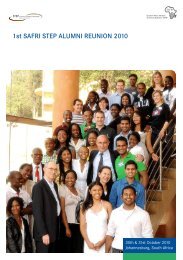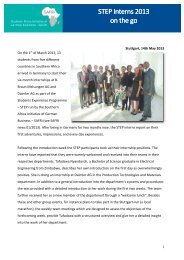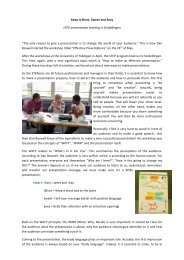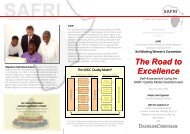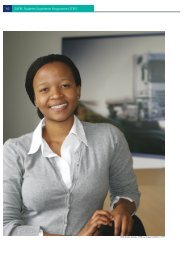Case Study: The Southern Africa Initiative of German Business - a ...
Case Study: The Southern Africa Initiative of German Business - a ...
Case Study: The Southern Africa Initiative of German Business - a ...
You also want an ePaper? Increase the reach of your titles
YUMPU automatically turns print PDFs into web optimized ePapers that Google loves.
<strong>Case</strong> <strong>Study</strong>: <strong>The</strong> <strong>Southern</strong> <strong>Africa</strong> <strong>Initiative</strong> <strong>of</strong> <strong>German</strong> <strong>Business</strong> -<br />
a B2B initiative promotes entrepreneurship and entrepreneurial thinking<br />
in southern <strong>Africa</strong><br />
Prepared for the International Conference on Innovation and Entrepreneurship, 16-18 November 2010,<br />
hosted by La Consolacion College, Mendiola, Manila, Philippines, in cooperation with the Hochschule<br />
Wismar, Wismar, <strong>German</strong>y, and Shijiazhuang University <strong>of</strong> Economics, Hebei, China<br />
Nina E. Mapili<br />
SAFRI Journey to Excellence Program, and Mapili GmbH<br />
Alpenstr. 11, Friedrichshafen, <strong>German</strong>y<br />
nina@mapili.com<br />
Tel: +49 7541 33773, Mobile: +49 172 9586271<br />
www.safri.de, www.mapili.com<br />
Abstract<br />
SAFRI, the <strong>Southern</strong> <strong>Africa</strong> <strong>Initiative</strong> <strong>of</strong> <strong>German</strong> <strong>Business</strong>, is a private B2B initiative created in 1996<br />
by the Afrika-Verein (AV), the Federation <strong>of</strong> <strong>German</strong> Industries (BDI) and the Association <strong>of</strong> <strong>German</strong><br />
Chambers <strong>of</strong> Industry and Commerce (DIHK). Headed since its inception by Pr<strong>of</strong>. Juergen E.<br />
Schrempp, the now retired Chairman <strong>of</strong> Daimler-Benz, then DaimlerChrysler (now Daimler AG), it<br />
has supported many different initiatives aimed at focusing attention on the economic potential <strong>of</strong> the<br />
member states <strong>of</strong> the <strong>Southern</strong> <strong>Africa</strong>n Development Community (SADC) and further promoting<br />
<strong>German</strong> business activities in the region.<br />
One key area <strong>of</strong> activity has been promoting entrepreneurship and entrepreneurial thinking in the<br />
region. Originally through the SAFRI HRD Project, and more recently through SAFRI’s Journey to<br />
Excellence (J2Ex) Program, small and medium enterprises (SMEs), and increasingly micro businesses<br />
and enterprising individuals, have been assisted in improving their strategic focus, competitiveness,<br />
and levels <strong>of</strong> organizational/individual excellence via training and mentoring. Local facilitators,<br />
mentors, and excellence assessors have been trained in parallel.<br />
Workshops have been conducted in 11 <strong>of</strong> the 15 SADC countries. Well over a thousand people have<br />
been trained since the introduction <strong>of</strong> the Journey to Excellence Program in 2006.<br />
<strong>The</strong> EFQM Excellence Model, an internationally-recognized management tool, is at the core <strong>of</strong> the<br />
J2Ex program, which <strong>of</strong>fers entry points for management teams at different levels <strong>of</strong> organizational<br />
maturity, as well as for individuals wanting to lead an enterprising life.<br />
<strong>The</strong> author consults for the SAFRI Chairman’s Office, whose work is funded by Daimler AG (and<br />
previously by DaimlerChrysler and Daimler-Benz). She developed the initial program for working<br />
with SADC businesses in 1998, and continues program development and implementation to the<br />
present. <strong>The</strong> Journey to Excellence Program IP belongs to her company, Mapili GmbH, based in<br />
Friedrichshafen, <strong>German</strong>y.<br />
This paper explores the motivation, approaches, challenges, successes, lessons learned, and way<br />
forward in this unique, long-term, privately-funded initiative’s work promoting entrepreneurship in<br />
SADC.<br />
Keywords: <strong>Africa</strong>, SADC, entrepreneurship, SME, SMME, training, mentoring, Journey to<br />
Excellence, J2Ex, B2B, education, organisational excellence, organizational excellence, SAFRI,<br />
Daimler, Juergen E. Schrempp, EFQM, excellence model, <strong>Business</strong> Development Services, BDS, AV,<br />
BDI, DIHK<br />
MAPILI: <strong>Case</strong> <strong>Study</strong>: SAFRI - a B2B initiative promotes entrepreneurship and entrepreneurial thinking in southern <strong>Africa</strong> 1
<strong>Case</strong> <strong>Study</strong>:<br />
SAFRI - a B2B initiative promotes entrepreneurship and entrepreneurial<br />
thinking in southern <strong>Africa</strong><br />
1. Background<br />
For decades, even centuries, <strong>Africa</strong> has been written <strong>of</strong>f by people around the world as a hopeless<br />
continent. Its mention conjures images <strong>of</strong> war, famine, disease, poverty… Yes, there is war, famine,<br />
disease and poverty in <strong>Africa</strong>, but what many have missed is that there is also an exciting flip side to<br />
that negative picture. See, for example, the IMF’s projected GDP growth for 2010-2011( 2 IMF):<br />
With South <strong>Africa</strong>’s election <strong>of</strong> President Nelson Mandela in 1994, South <strong>Africa</strong> lost its pariah status.<br />
<strong>The</strong> same year it joined SADC, the <strong>Southern</strong> <strong>Africa</strong>n Development Community, whose origins lie in<br />
the struggle <strong>of</strong> the “Front Line States” against white minority rule in apartheid South <strong>Africa</strong>. SADC<br />
now aims to promote socio-economic cooperation, regional integration, and political and security<br />
cooperation amongst its 15 member states ( 2 SADC).<br />
By 1996, the country was well on its way to becoming the new South <strong>Africa</strong>, the Rainbow Nation,<br />
<strong>Africa</strong>'s motor for development. That year, <strong>German</strong> Chancellor Helmut Kohl paid a state visit to<br />
South <strong>Africa</strong>n President Nelson Mandela. His delegation included representatives <strong>of</strong> the <strong>German</strong><br />
business community, whom he challenged to actively welcome their <strong>Africa</strong>n colleagues into the global<br />
business community.<br />
SAFRI, the <strong>Southern</strong> <strong>Africa</strong> <strong>Initiative</strong> <strong>of</strong> <strong>German</strong> <strong>Business</strong>, was created later that year by three leading<br />
<strong>German</strong> business organizations: Afrika-Verein (AV, <strong>German</strong>-<strong>Africa</strong>n <strong>Business</strong> Association), the<br />
Federation <strong>of</strong> <strong>German</strong> Industries (BDI) and the Association <strong>of</strong> <strong>German</strong> Chambers <strong>of</strong> Industry and<br />
Commerce (DIHK).<br />
Since its creation, SAFRI has supported many initiatives aimed at focusing attention on the economic<br />
potential <strong>of</strong> the SADC member states and further promoting <strong>German</strong> business activities in the region.<br />
( 3 SAFRI)<br />
SAFRI has been headed since its inception by Pr<strong>of</strong>. Juergen E. Schrempp, the now retired Chairman <strong>of</strong><br />
Daimler-Benz, then DaimlerChrysler (now Daimler AG). Mr. Schrempp had served in the<br />
management <strong>of</strong> Mercedes-Benz South <strong>Africa</strong>, the Group's South <strong>Africa</strong>n subsidiary, for over a decade,<br />
MAPILI: <strong>Case</strong> <strong>Study</strong>: SAFRI - a B2B initiative promotes entrepreneurship and entrepreneurial thinking in southern <strong>Africa</strong> 2
and during this time he developed a<br />
deep affection for the country and a<br />
commitment to improving the region's<br />
social and economic conditions. He<br />
has a close relationship with expresident<br />
Mandela, served as a<br />
member <strong>of</strong> the International<br />
Investment Council <strong>of</strong> the President <strong>of</strong><br />
South <strong>Africa</strong>, and has been South<br />
<strong>Africa</strong>’s Honorary General Consul for<br />
a number <strong>of</strong> <strong>German</strong> states for many<br />
years.<br />
SAFRI supports different initiatives in<br />
<strong>German</strong>y aimed at focusing attention<br />
on the economic potential <strong>of</strong> SADC<br />
countries and promotes <strong>German</strong><br />
business activities in the region. In<br />
parallel, it has been working in SADC<br />
to promote entrepreneurship and<br />
entrepreneurial thinking, with the aim<br />
to supporting regionalization and<br />
improve the quality <strong>of</strong> life <strong>of</strong> the<br />
people in SADC.<br />
Originally through the SAFRI HRD<br />
Project, and more recently through<br />
implementation <strong>of</strong> the Journey to<br />
Excellence (J2Ex) Program ( 5 Mapili),<br />
small and medium enterprises (SMEs),<br />
and increasingly micro businesses and enterprising individuals, have been assisted in improving their<br />
strategic focus, competitiveness, and levels <strong>of</strong> organizational/individual excellence via training and<br />
mentoring. Local facilitators, mentors, and excellence assessors have been trained in parallel.<br />
<strong>The</strong> J2Ex Program was developed on the basis <strong>of</strong> the EFQM Excellence Model, an internationallyrecognized<br />
management tool. It <strong>of</strong>fers entry points for management teams at different levels <strong>of</strong><br />
organizational maturity, as well as for individuals wanting to lead an enterprising life.<br />
Workshops have been conducted in 11 <strong>of</strong> the 15 SADC countries (all except Angola, Democratic<br />
Republic <strong>of</strong> Congo, Mauritius, and Seychelles). Well over a thousand people have been trained since<br />
the introduction <strong>of</strong> the Journey to Excellence Program in 2006.<br />
In addition, SAFRI, in cooperation with Mercedes-Benz South <strong>Africa</strong>, runs an internship program for<br />
students and recent graduates from SADC. Participants work in <strong>German</strong>y for 6 months, gaining both<br />
practical work experience and invaluable intercultural experiences.<br />
All <strong>of</strong> the work done by or through the SAFRI Chairman’s Office is funded by Daimler AG (and<br />
previously by DaimlerChrysler and Daimler-Benz). I developed the initial program for working with<br />
SADC businesses in 1998, and continue development and implementation to the present. <strong>The</strong><br />
continuous improvement <strong>of</strong> a single program is a great strength when seen in comparison to the short<br />
term interventions that are characteristic <strong>of</strong> many development agencies.<br />
MAPILI: <strong>Case</strong> <strong>Study</strong>: SAFRI - a B2B initiative promotes entrepreneurship and entrepreneurial thinking in southern <strong>Africa</strong> 3
2. Focus <strong>of</strong> the paper<br />
This paper explores the motivation, approaches, challenges, successes, lessons learned, and ways<br />
forward in this unique, long-term, privately-funded initiative’s work promoting entrepreneurship in<br />
SADC. It is broken down as follows:<br />
• Motivation, Approach, Vision, Goals and Strategies<br />
• <strong>The</strong> SAFRI HRD Project: early phases <strong>of</strong> the program and lessons learned along the way<br />
• <strong>The</strong> SAFRI Journey to Excellence Program<br />
• Ways forward<br />
3. Motivation, Approach, Vision, Goals, Strategies<br />
3.1 Motivation<br />
<strong>German</strong>y, a country without significant natural resources other than its people, is an exporting<br />
powerhouse. Much <strong>of</strong> its strength is derived from a strong backbone <strong>of</strong> highly competitive small and<br />
medium sized industries (SMEs). <strong>German</strong> businesses need new markets to grow, and as we can see in<br />
Figure 1, GDP growth in SADC is generally high in comparison to Europe. SADC clearly <strong>of</strong>fers<br />
opportunities worth exploring.<br />
At the same time, all SADC countries are classified as developing economies ( 6 World Bank). Details<br />
can be seen in Figure 5. SAFRI’s work in SADC is built upon recognition that helping the region<br />
become economically strong,<br />
stable, and integrated is good for<br />
business. It focuses on areas that<br />
were key to <strong>German</strong>y’s own<br />
development: export capability and<br />
a strong SME sector ( 7 IfM Bonn).<br />
By strengthening businesses and<br />
promoting entrepreneurship,<br />
SAFRI supports the achievement<br />
<strong>of</strong> at least two <strong>of</strong> the UN’s<br />
Millennium Development Goals:<br />
• MDG 1: End Poverty and<br />
Hunger. Target 1.B, which<br />
concerns achieving full and<br />
productive employment and<br />
decent work for all, including<br />
women and young<br />
people, is especially relevant.<br />
( 9 UN)<br />
• MDG 8: Develop a global<br />
partnership for development.<br />
Target 8.A, which concerns<br />
developing countries gaining<br />
greater access to the markets<br />
<strong>of</strong> developed countries, is<br />
directly impacted by empowering<br />
entrepreneurs, and<br />
increasing their ability to<br />
trade across borders. ( 10 UN)<br />
MAPILI: <strong>Case</strong> <strong>Study</strong>: SAFRI - a B2B initiative promotes entrepreneurship and entrepreneurial thinking in southern <strong>Africa</strong> 4
Figure 5. Area, population, density, and GNI (gross national income) per capita in SADC .<br />
<strong>The</strong> World Bank classifies all SADC countries as “developing economies” based upon their annual<br />
GNI (gross national income) per capita. <strong>The</strong>y are distributed amongst income classifications as<br />
follows: Lower income (≤ $995), Lower middle ($996-$3945), Upper middle ($3946-$12,195)<br />
No workshops have been held in the countries in italics.<br />
Additional countries are presented for comparison in the second part <strong>of</strong> the figure.<br />
SADC<br />
Country<br />
Area km 2<br />
% SADC<br />
Area<br />
Pop. 2008<br />
(WB data)<br />
% SADC<br />
Pop<br />
Pop.<br />
density /<br />
km 2<br />
GNI per<br />
capita 2008<br />
Zimbabwe 390,757 3.95% 12,462,879 4.73% 32 ?<br />
South <strong>Africa</strong> 1,219,090 12.33% 48,687,000 18.48% 40 5,730<br />
Malawi 118,484 1.20% 14,846,182 5.63% 125 250<br />
Botswana 581,730 5.89% 1,921,122 0.73% 3 5,920<br />
Namibia 824,292 8.34% 2,129,854 0.81% 3 4,111<br />
Lesotho 30,355 0.31% 2,049,429 0.78% 68 1,060<br />
Swaziland 17,364 0.18% 1,167,834 0.44% 67 2,540<br />
Mozambique 799,380 8.09% 22,382,533 8.49% 28 340<br />
Madagascar 587,041 5.94% 19,110,941 7.25% 33 420<br />
Tanzania 947,300 9.58% 42,483,923 16.12% 45 400<br />
Zambia 752,618 7.61% 12,620,219 4.79% 17 950<br />
DRC 2,344,858 23.73% 64,256,635 24.39% 27 150<br />
Angola 1,246,700 12.61% 18,020,668 6.84% 14 2,590<br />
Mauritius 2,040 0.02% 1,268,854 0.48% 622 5,980<br />
Seychelles 455 0.005% 86,956 0.03% 191 10,220<br />
TOTAL for SADC 9,883,414 263,495,029 27<br />
SADC as % <strong>of</strong> world<br />
land mass<br />
6.64% 3.93% SADC as % <strong>of</strong> world pop.<br />
Some other countries for comparison<br />
Philippines 300,000 90,348,437 301 1,890.00<br />
Denmark 43,094 5,493,621 127 58,800.00<br />
<strong>German</strong>y 357,022 82,110,097 230 42,710.00<br />
USA 9,826,675 304,060,000 31 47,930.00<br />
World 148,940,000 6,697,254,040 45 8,654.48<br />
(Compiled from 11 CIA and 12 World Bank)<br />
3.2 Approach<br />
From the very beginning, SAFRI has focused on engaging directly with SADC businesspeople on a<br />
business-to-business (B2B) basis. Our non-bureaucratic approach made it possible to quickly take<br />
advantage <strong>of</strong> opportunities, and constantly review activities and implement improvements. Even so,<br />
the learning curve was steep. <strong>The</strong>re were no similar business-to-business initiatives with comparable<br />
goals, and benchmarking with aid-based programs with similar focus areas did not result in examples<br />
we felt worth emulating.<br />
MAPILI: <strong>Case</strong> <strong>Study</strong>: SAFRI - a B2B initiative promotes entrepreneurship and entrepreneurial thinking in southern <strong>Africa</strong> 5
Seen from the current perspective, SAFRI’s engagement with SADC entrepreneurs can be broken into<br />
two parts: Part 1, “<strong>The</strong> SAFRI Human Resources Development (HRD) Project” (1998-2005), and Part<br />
2, “<strong>The</strong> SAFRI Journey to Excellence (J2Ex) Program” (as <strong>of</strong> 2006).<br />
3.3 Vision for SAFRI’s work in SADC<br />
In our engagement with SADC businesses, organizations and individuals, we work to create a future in<br />
which “Enterprises in southern <strong>Africa</strong> are flourishing.” We do so by empowering entrepreneurs,<br />
management teams and nascent entrepreneurs through training and mentoring; by preparing local<br />
trainers and mentors to work with them; and by strengthening the institutions that support<br />
entrepreneurial growth and development.<br />
3.4 Goal <strong>of</strong> SAFRI’s Journey to Excellence Program<br />
<strong>The</strong> program’s primary goal is to increase the numbers and competitiveness <strong>of</strong> enterprises in SADC.<br />
Indicators include:<br />
• Degree to which workshop / mentoring program participants achieve the goals set out in their<br />
action plans.<br />
• Level <strong>of</strong> satisfaction in the program indicated in feedback forms<br />
• Numbers <strong>of</strong> workshops and participants<br />
• Number <strong>of</strong> mentors and facilitators qualified through the program<br />
3.5 Strategies <strong>of</strong> SAFRI’s Journey to Excellence Program<br />
<strong>The</strong> overarching strategy is to work in conjunction with local and international partners in SADC to<br />
<strong>of</strong>fer an excellent, user-centered program for developing entrepreneurial skills and improving<br />
organizational excellence and competitiveness. This strategy has essentially been in place since the<br />
early days <strong>of</strong> engagement in SADC. Tactics and plans, however, have changed.<br />
Deconstructed, the individual elements as currently implemented become clear:<br />
• We work in conjunction with local and regional partners with congruent goals and direct<br />
access to potential program participants, trainers and mentors. Ideally, these partners have<br />
significant own funds to invest in our joint efforts.<br />
• <strong>The</strong> excellent quality <strong>of</strong> the J2Ex Program has grown on the basis <strong>of</strong> a world class<br />
management tool, the EFQM Excellence Model, coupled with well over a decade <strong>of</strong><br />
experience on the ground in SADC. <strong>The</strong> Program is continuously improved on the basis <strong>of</strong><br />
experience in workshops, feedback, learning and benchmarking.<br />
• From its original high level approach, the J2Ex Program has expanded to <strong>of</strong>fer a wide range <strong>of</strong><br />
entry points suitable to users ranging from enterprising individuals, through emerging<br />
enterprises to mature businesses or other organizations.<br />
• Skills upgrading and competitiveness are focused primarily around the development and<br />
implementation <strong>of</strong> strategic frameworks and associated action plans while pursuing the greater<br />
goal <strong>of</strong> organizational excellence. <strong>The</strong> region is awash with consultants wanting to write<br />
(cookie-cutter) business plans, strategic plans, marketing plans etc. for MSMEs, <strong>of</strong>ten with<br />
large government subsidies. In contrast, our emphasis is on empowering people to take charge<br />
<strong>of</strong> their lives, businesses and/or organizations themselves. If consultants are to be engaged, it<br />
should only be for clearly defined tasks in alignment with company vision, mission, goals and<br />
strategies, and specific tasks and outcomes to be achieved must be clearly delineated by<br />
management.<br />
MAPILI: <strong>Case</strong> <strong>Study</strong>: SAFRI - a B2B initiative promotes entrepreneurship and entrepreneurial thinking in southern <strong>Africa</strong> 6
3.6 Distribution <strong>of</strong> activities<br />
Since the beginning <strong>of</strong> SAFRI interventions in the region, we have worked in 11 <strong>of</strong> the 15 SADC<br />
countries. Counting from the introduction <strong>of</strong> the J2Ex Program in 2006, we have worked in 9 SADC<br />
countries, and even held workshops in <strong>German</strong>y for people/organizations with a SADC connection.<br />
Figure 6. J2Ex Workshops held per country, and some basic information about our engagement.<br />
Country # Works. Comments<br />
RSA 12<br />
South <strong>Africa</strong> has a huge number <strong>of</strong> MSME (Micro, Small and Medium<br />
Enterprise) support programs. We take opportunities as they come, but do not<br />
spend a lot <strong>of</strong> time pursuing them. Our work in South <strong>Africa</strong> has been with a<br />
wide variety <strong>of</strong> partners.<br />
Namibia 12<br />
High number primarily due to the focus <strong>of</strong> a regional partner. <strong>German</strong>y does,<br />
however, have a shared history with Namibia, and we have a variety <strong>of</strong> local<br />
contacts and partners.<br />
Zimbabwe 11<br />
Zimbabwe, despite all <strong>of</strong> its difficulties, has the advantage <strong>of</strong> significant natural<br />
resources, the highest level <strong>of</strong> literacy (with the exception <strong>of</strong> tiny Seychelles<br />
( 13 Aitchison and Rule), and, in the author’s experience, the most enterprising<br />
population. It is therefore a focal point for our work.<br />
Madagascar 10<br />
We began work in Madagascar at the request <strong>of</strong> now deposed President Marc<br />
Ravalomanana, and built up a small team <strong>of</strong> local facilitators who can present in<br />
French and Malagasy. Work has come to a halt because <strong>of</strong> the 2009 coup.<br />
Malawi 5<br />
Home to one <strong>of</strong> our success stories, a company that regularly organizes<br />
workshops, and has tried, unsuccessfully, to help identify new local organizing<br />
partners. We are exploring options for increasing engagement.<br />
Lesotho 5<br />
Combination <strong>of</strong> work with very old partners from HRD Project workshops and<br />
in connection with a regional partner.<br />
Botswana 5 A focus country for a regional partner.<br />
<strong>German</strong>y 4 Workshops for people/organizations with a SADC connection<br />
Swaziland 3<br />
Intermittent work with a very old partner: a Swazi consulting company that grew<br />
out <strong>of</strong> the early days <strong>of</strong> the SAFRI HRD Project.<br />
Tanzania 2<br />
Workshops held in connection with a regional partner. Tanzania is a “donor’s<br />
darling”, is receiving a lot <strong>of</strong> attention, and has proven a “difficult nut to crack”<br />
for a program not bringing along a lot <strong>of</strong> money.<br />
Mozambique<br />
Held a number <strong>of</strong> HRD Project workshops, but have not found a partner with<br />
0 whom to make an entry with J2Ex.<br />
Zambia<br />
Work during HRD Project was very challenging. Have not found a partner with<br />
0 whom to make an entry with J2Ex.<br />
DRC<br />
Concern for personal safety and reports <strong>of</strong> widespread corruption, as well as lack<br />
0 <strong>of</strong> a local partner have led to very low prioritization.<br />
Angola<br />
Very high financial and language hurdles to entering the market. Partners are<br />
0 currently being sought.<br />
Mauritius 0 Not targeted due to low relative need.<br />
Seychelles 0 Not targeted due to low relative need.<br />
TOTAL 69<br />
4. <strong>The</strong> SAFRI HRD Project: early phases <strong>of</strong> the program, and lessons learned along the way<br />
( 14 Mapili)<br />
<strong>The</strong> SAFRI HRD Project, which ran from 1998-2005, focused on promoting entrepreneurship,<br />
competitiveness, regional integration and trade through the development and upgrading <strong>of</strong><br />
entrepreneurial skills and organizational performance excellence in small and medium enterprises<br />
(SMEs) in SADC. Since so many projects were being centred on South <strong>Africa</strong>, and because we<br />
quickly developed a strategic partnership with the South <strong>Africa</strong>n Excellence Foundation (SAEF), we<br />
put most <strong>of</strong> our energy into other SADC countries.<br />
<strong>The</strong> SAFRI HRD Project coincided to a great extent with the partnership with SAEF and the use <strong>of</strong> the<br />
South <strong>Africa</strong>n Excellence Model and its public domain version, the SADC Quality Model in our work.<br />
<strong>The</strong> Model served, almost from the beginning, as the organizing force in what were known as “SAFRI<br />
MAPILI: <strong>Case</strong> <strong>Study</strong>: SAFRI - a B2B initiative promotes entrepreneurship and entrepreneurial thinking in southern <strong>Africa</strong> 7
Entrepreneurs' Workshops”. SAEF was our sustainability plan: it would focus first for promoting<br />
organizational excellence in South <strong>Africa</strong>, and then follow our footsteps into the region.<br />
Though it was not done implicitly at the time, the SAFRI HRD Project can be divided into four<br />
general, sometimes overlapping, phases, named here for the major activity or new development during<br />
that time period.<br />
1. Phase 1, 1998-99: Entering Foreign Markets<br />
2. Phase 2, 2000-01: Excellence – the Key to Competitiveness<br />
3. Phase 3, 2002-03: <strong>The</strong> Road to Excellence<br />
4. Phase 4, 2004-05: Entrepreneurial Mentoring<br />
4.1 Phase 1, 1998-1999: "Entering Foreign Markets"<br />
<strong>The</strong> SAFRI HRD Project kicked <strong>of</strong>f with a workshop/conference “SAFRI and the Promotion <strong>of</strong><br />
Entrepreneurial Skills in SADC” held in May, 1998 in Namibia. It focused on analysing<br />
entrepreneurs’ needs in relation to what SAFRI could potentially <strong>of</strong>fer. Representatives <strong>of</strong> southern<br />
<strong>Africa</strong>n business organizations (Chambers <strong>of</strong> Commerce and etc.), the SADC Secretariat, the World<br />
Bank, and <strong>German</strong> Technical Cooperation (GTZ) and <strong>German</strong> NGOs active in relevant areas in the<br />
region attended.<br />
Out <strong>of</strong> this we developed the concept <strong>of</strong> Entrepreneurs' Workshops. With an eye to promoting<br />
regionalisation via cross border trade, we settled on the theme Entering Foreign Markets. <strong>German</strong>y is<br />
an export powerhouse, and the idea was to help SMEs understand export markets and the associated<br />
opportunities and challenges - partially by sharing <strong>German</strong> export experience. <strong>The</strong> program was<br />
developed with the assistance <strong>of</strong> a <strong>German</strong> technical college that specialises in export. Presenters<br />
were all affiliated with <strong>German</strong> companies active in the region, or <strong>German</strong>s working in the region.<br />
<strong>The</strong> first two Entrepreneurs' Workshops were held in 1999 in Zimbabwe and Mozambique. Partners<br />
included the national Chamber <strong>of</strong> Commerce organizations, the Confederation <strong>of</strong> Zimbabwe Industry,<br />
and in Mozambique, the <strong>Southern</strong> <strong>Africa</strong>n Enterprise Network (SAEN), a small organization <strong>of</strong> "new<br />
generation <strong>Africa</strong>n entrepreneurs”.<br />
<strong>The</strong>se workshops took place shortly after the founding <strong>of</strong> the South <strong>Africa</strong>n Excellence Foundation<br />
(SAEF), which was modelled after the European Foundation for Quality Management (EFQM). <strong>The</strong><br />
South <strong>Africa</strong>n Excellence Model (similar to the EFQM Excellence Model) and the concept <strong>of</strong> Self-<br />
Assessment were introduced in plenary and further explored in working groups. <strong>The</strong>se ideas caught<br />
the interest <strong>of</strong> participating entrepreneurs in both countries.<br />
In Mozambique, the attending entrepreneurs surprised us at the close <strong>of</strong> the workshop with a formal<br />
declaration <strong>of</strong> their intention <strong>of</strong> creating a Mozambican Excellence Foundation. Unfortunately, in<br />
early 2000, Mozambique was hit by devastating floods. <strong>The</strong> entrepreneurs that had been working on<br />
creating an excellence foundation diverted their energies to disaster relief, and the momentum for<br />
development <strong>of</strong> a foundation seeped away with the flood waters.<br />
Major political difficulties contributed: existing government organizations didn't want to see an<br />
excellence foundation established because they felt that its proposed activities fell within their area <strong>of</strong><br />
responsibility. In the end, the entrepreneurs turned their efforts to improving the business climate in<br />
the country by engaging the government in dialogue at the top level<br />
Lessons learned:<br />
• <strong>The</strong> choice <strong>of</strong> partners is crucial. <strong>Business</strong> organizations such as Chambers <strong>of</strong> Commerce were<br />
not able to perform at the level needed for a successful workshop. Our most fruitful cooperation<br />
was with SAEN.<br />
• Workshop content must be relevant to participants now, not at some undefined time in the<br />
MAPILI: <strong>Case</strong> <strong>Study</strong>: SAFRI - a B2B initiative promotes entrepreneurship and entrepreneurial thinking in southern <strong>Africa</strong> 8
future. People want help with today's challenges, not tomorrow’s.<br />
4.2 Phase 2, 2000-2001: "Excellence – the Key to Competitiveness"<br />
In reviewing our experiences in Zimbabwe and Mozambique, we concluded that the basic format was<br />
effective and successful. SME entrepreneurs like to come together in nice surroundings and talk about<br />
business with respected colleagues from near and far.<br />
It was clear, however, that we could better meet entrepreneurs' needs by making the content more<br />
immediately relevant. Some <strong>of</strong> our participants had MBAs from very reputable universities. Some<br />
were "seat <strong>of</strong> the pants" entrepreneurs with no formal business education, but lots <strong>of</strong> "on-the-job"<br />
experience. We needed to find a less academic, more "real world" approach that would engage<br />
participants with heterogeneous business experience and various levels <strong>of</strong> formal business education.<br />
I thought that the South <strong>Africa</strong>n Excellence Model, as implemented in a questionnaire approach to<br />
Self-Assessment being developed by people with DaimlerChrysler South <strong>Africa</strong> and SAEF, might<br />
<strong>of</strong>fer a solution, and developed a two-pronged strategy to take the idea forward:<br />
• Train strategically placed people on the Model—people who were in a position to continue<br />
“spreading the word” by including organizational performance excellence in their curricula<br />
and/or private consulting <strong>of</strong>ferings.<br />
• Find and recognize role model businesses and entrepreneurs. Assessment would be done using<br />
the Model.<br />
DaimlerChrysler sponsored two complementary activities during this phase, but implementation<br />
proved challenging:<br />
• A high level staff position at SAEF specifically for the development <strong>of</strong> SME training. This<br />
person was included in SAFRI HRD activities and SAEF training.<br />
- Unfortunately, he was completely unable to meet the challenge and his contract<br />
was terminated.<br />
• <strong>The</strong> Juergen E. Schrempp – SAFRI Award for Excellence. <strong>The</strong> award was designed especially<br />
to recognise excellent SADC SMEs outside South <strong>Africa</strong> (which was developing its own award<br />
program).<br />
- It was an idea ahead <strong>of</strong> its time. <strong>The</strong>re was a complete dearth <strong>of</strong> candidates with the<br />
requisite levels <strong>of</strong> excellence to be recognised in an internationally-benchmarked<br />
competition – especially amongst black-owned SMEs.<br />
Five Entrepreneurs' Workshops were held in 2000-2001: in Swaziland, Botswana, South <strong>Africa</strong>,<br />
Lesotho, and Mozambique. Each was attended by about 30 local entrepreneurs, all <strong>of</strong> whom<br />
completed a Self-Assessment <strong>of</strong> their organizations in the course <strong>of</strong> the workshop. South <strong>Africa</strong>nbased<br />
<strong>German</strong> executives dominated the facilitation teams, but a small corps <strong>of</strong> local trainers was<br />
being groomed to continue with the work.<br />
During this phase, increasing use was made <strong>of</strong> Self-Assessment and Assessor training for<br />
entrepreneurs. Of those who attended pre-workshop training, the most promising companies were<br />
assisted in follow up activities, i.e. implementation <strong>of</strong> changes in their business resulting from the self<br />
assessment and identification <strong>of</strong> key performance gaps. In return, they prepared case studies and<br />
presented these at the workshops.<br />
<strong>The</strong>se exercises repeatedly highlighted the inappropriateness <strong>of</strong> the SAEF Self-Assessment and<br />
Assessor training (modelled on EFQM training <strong>of</strong> the same name) for our – and the entrepreneurs' -<br />
needs. Though it had long been promised, SAEF's efforts to develop SME-appropriate training were<br />
way behind schedule, and what had been produced was not up to our needs or expectations. By this<br />
time the SAFRI HRD Project had more directly relevant experience than anyone else, so I began SME<br />
training module development in late 2001.<br />
MAPILI: <strong>Case</strong> <strong>Study</strong>: SAFRI - a B2B initiative promotes entrepreneurship and entrepreneurial thinking in southern <strong>Africa</strong> 9
Lessons learned:<br />
• We needed a mass market instrument – a training course appropriate for SME owners and<br />
managers - that would enable us and others to bring the model to more people. SAFRI<br />
Entrepreneurs' Workshops could only reach the tip <strong>of</strong> a huge iceberg.<br />
• We needed to address the issue <strong>of</strong> follow up after training/workshops. People reported making<br />
good starts at implementing improvements, but then “falling <strong>of</strong>f the boat” after a few weeks.<br />
4.3 Phase 3, 2002-2003: "<strong>The</strong> Road to Excellence"<br />
During the development <strong>of</strong> the new training module, <strong>The</strong> Road to Excellence, we invited input from<br />
entrepreneurs and trainers with whom we had worked in the past. I guided, and then finalised, the<br />
structuring and content <strong>of</strong> the course and prepared the trainers manual in outcome based training<br />
format. A training-<strong>of</strong>-trainers course for the presentation <strong>of</strong> the new module was held in August,<br />
2002. All participants had “come up” through our program. All were SAEF-certified Assessors, and<br />
most had been trained by SAEF to the level <strong>of</strong> Executive Facilitator.<br />
Testing began immediately, and results were very positive. We were thrilled to see participants<br />
"getting it", i.e. understanding the logic behind the model. <strong>The</strong>y spoke <strong>of</strong> eye-opening experiences.<br />
This was a major breakthrough. <strong>The</strong> combination <strong>of</strong> the user-friendly SADC Quality Model (or<br />
SAEM) Questionnaire and Workbook and Road to Excellence (RtE) training finally gave us what we<br />
needed to reach more SMEs than would ever have been possible through the high pr<strong>of</strong>ile<br />
Entrepreneurs’ Workshops alone.<br />
Whereas an Entrepreneurs’ Workshop required a major investment <strong>of</strong> time, effort and money, RtE<br />
could be run for up to 15 participants with a single trainer, and was therefore much more cost<br />
effective. Interestingly, we discovered that the RtE also worked well in a corporate environment.<br />
DaimlerChrysler South <strong>Africa</strong> (DCSA) adopted the program immediately, and a whole team <strong>of</strong> young<br />
managers was trained to present the Road to Excellence module for in-house use. Unfortunately, the<br />
DCSA CEO, who had been a major supporter <strong>of</strong> our work, was later transferred to <strong>German</strong>y, and his<br />
successor discontinued the in-house program. <strong>The</strong> very great majority <strong>of</strong> DCSA people trained<br />
through the program subsequently left the company.<br />
<strong>The</strong> Schrempp Award<br />
<strong>The</strong> Schrempp Award process remained very challenging in 2002. Even the most sophisticated SMEs<br />
needed significant assistance to prepare for, and then put together, an award application. Lots <strong>of</strong><br />
money went into administration, promotion, assessment and site visits, but the results were thin. No<br />
company even came close to the internationally benchmarked threshold for Award level. We had an<br />
award, but no award winners.<br />
On the positive side, we found that working with the companies in a mentoring relationship produced<br />
good results. In 2003, the final year <strong>of</strong> its funding, the Schrempp Award was therefore transformed<br />
into <strong>The</strong> Juergen E. Schrempp – SAFRI Award for Excellence Mentorship Program. Practically<br />
speaking, this meant that the available funding was focused more on mentoring the companies than on<br />
assessment, and the emphasis was no longer placed on getting an award, but on progressing as a<br />
company. <strong>The</strong>re was still an assessment, though, based on a completed SADC QM questionnaire.<br />
All companies that completed the process were recognised for their "Dedication to Excellence". <strong>The</strong><br />
participating companies were honoured at the 2003 international SAFRI Entrepreneurs' Workshop,<br />
where the CEOs/MDs and some <strong>of</strong> their top managers acted as resource people.<br />
Lessons learned:<br />
• <strong>The</strong> training success <strong>of</strong> the Road to Excellence module is very positive, but it does not solve two<br />
issues:<br />
- Post workshop action plan implementation by entrepreneurs was <strong>of</strong>ten weak<br />
- <strong>The</strong> trainers we had trained were not presenting RtE workshops on their own. SME<br />
entrepreneurs have a basic unwillingness to invest in training and consulting. This made<br />
MAPILI: <strong>Case</strong> <strong>Study</strong>: SAFRI - a B2B initiative promotes entrepreneurship and entrepreneurial thinking in southern <strong>Africa</strong> 10
it very hard for local consultants to sell training on the open market without the support<br />
<strong>of</strong> some kind <strong>of</strong> SME promotion funding.<br />
• Mentoring is more effective than anything else we have seen when it comes to ensuring follow<br />
through after Self-Assessment.<br />
• <strong>The</strong> mentoring process needs to be carefully defined and monitored, and appropriate measures<br />
<strong>of</strong> success developed.<br />
4.4 Phase 4, 2004-2005: Entrepreneurial Mentoring<br />
Mentoring was positioned at the heart <strong>of</strong> our work. In preparation for 2004 activities, a mentoring<br />
program handbook was developed that clearly outlined the mentoring process, explained expectations<br />
and participation requirements in a Terms <strong>of</strong> Reference, and provided templates for consensus finding,<br />
action plans, weekly reports, mid term reports, and case studies. A monitoring process was set up and<br />
used to track progress.<br />
<strong>The</strong> Mentoring Cycle: charting and following a course to sustainable Excellence<br />
<strong>The</strong> Road to Excellence, initially the name given to the training program, slowly became synonymous<br />
with an entire process: the path taken by an organization striving for excellence within the framework<br />
<strong>of</strong> the SAFRI HRD Project. Road to Excellence (RtE) training, mentoring, and Excellence - the Key to<br />
Competitiveness (EKC) Entrepreneurs' Workshops were aligned and created a cycle that organizations<br />
could follow:<br />
1. EKC Workshops, with their exclusive positioning, were <strong>of</strong>fered to entrepreneurs, MDs and<br />
CEOs. Resource people were primarily top executives from companies that have completed one<br />
mentoring cycle, augmented by special guests (the <strong>German</strong> connection).<br />
2. During the Workshop, resource people made model-centric presentations and led small working<br />
groups. Participants completed a Self-Assessment <strong>of</strong> their business using the questionnaire,<br />
prepared a preliminary action plan to address their key improvement opportunities, and learned<br />
about the mentorship program.<br />
3. Those interested in bringing their company into the process could make arrangements for<br />
training to be held for their entire management team. <strong>The</strong>y were encouraged to invite other<br />
companies to join them in order to reduce costs, as these had to be carried by the participating<br />
companies.<br />
4. Road to Excellence training was held for management teams. Upon successful completion, the<br />
company head could immediately apply for admission to the mentorship program.<br />
5. Upon acceptance, the trainer/mentor began work with the individual management team. <strong>The</strong><br />
teams prioritised improvement opportunities, and prepared action plans to address them. <strong>The</strong><br />
action plans had weekly deliverables that were to be reported/discussed with the mentor in<br />
weekly e-mail / telephone contact.<br />
6. After 8-12 months, they prepared a simple case study to be presented by the company head at an<br />
Entrepreneurs' Workshop. Post mortem discussions are held on how the process can be<br />
improved, and the next cycle began - with improvements in place.<br />
Mentor development<br />
We tried repeatedly, and <strong>of</strong>ten not terribly successfully, to work not only with "virtual" long-distance<br />
mentors, but also with local ones. <strong>The</strong> <strong>of</strong>ten-encountered perception that “quality comes from abroad”<br />
was surely part <strong>of</strong> the problem: if you are an entrepreneur in a small southern <strong>Africa</strong>n country, you<br />
find it much more impressive to have a mentor from big South <strong>Africa</strong> than to have one from your own<br />
country, or even from a small neighbouring country. On the flip side <strong>of</strong> the same coin, it was, and<br />
remains, very hard to find local mentors.<br />
2004 Workshops<br />
In 2004, national workshops were held in Swaziland and Zimbabwe. An international workshop in<br />
South <strong>Africa</strong> once again served as the recognition platform for companies that participated in the<br />
MAPILI: <strong>Case</strong> <strong>Study</strong>: SAFRI - a B2B initiative promotes entrepreneurship and entrepreneurial thinking in southern <strong>Africa</strong> 11
year's mentorship program. During that workshop, "way forward" discussions held with executives<br />
from mentee companies. <strong>The</strong>y agreed that they needed to become more active in promoting business<br />
excellence, and committed themselves to seeking new companies well-suited to the mentorship<br />
program for 2005, and to help organise Road to Excellence training for them. <strong>The</strong>y also suggested a<br />
"benchmarking trip to <strong>German</strong>y", which became reality for three entrepreneurs.<br />
Distinctions blur between workshops and training<br />
In SAFRI HRD Project parlance we used the word “workshop” to denote the big, high pr<strong>of</strong>ile<br />
“Entrepreneurs’ Workshops, and the word “training” to refer to Road to Excellence interventions.<br />
Over time this distinction became irrelevant, and we now refer to all <strong>of</strong> our facilitator-led events that<br />
bring together a group <strong>of</strong> people to learn and network, as workshops.<br />
Lessons learned (and re-learned):<br />
• Mentors must be carefully developed. Not all good trainers are good mentors.<br />
• Local mentors are very useful, but finding, training and mentoring them is a huge challenge<br />
(that for the most part exceeds our financial means)<br />
• Depending entirely upon current mentee companies to identify and win new companies and<br />
organise training is not a successful strategy. Some are good at it, many aren't.<br />
4.5 2005: Tectonic movements change the game<br />
Two major changes occurred within a short span <strong>of</strong> each other in 2005:<br />
• <strong>The</strong> South <strong>Africa</strong>n Excellence Foundation "disintegrated", and<br />
• SAFRI Chairman Juergen E. Schrempp resigned as Chairman <strong>of</strong> the Board <strong>of</strong> Management <strong>of</strong><br />
DaimlerChrysler AG.<br />
<strong>The</strong> SAFRI HRD Project had positioned SAEF as the organization that would carry on with its work<br />
on the longer term. With its collapse (a subject worthy <strong>of</strong> a paper in itself, but strongly connected with<br />
issues <strong>of</strong> race, politics and skills gaps) the plan for the sustainability <strong>of</strong> our work also collapsed.<br />
On top <strong>of</strong> that, Pr<strong>of</strong>. Schrempp's resignation from his DCAG position led to all HRD Project activities<br />
being frozen for more than half a year during the reorganization and re-prioritisation introduced by his<br />
successor.<br />
5. <strong>The</strong> SAFRI Journey to Excellence (J2Ex) Program<br />
Convinced that there was a need - and a market - for the kind <strong>of</strong> program described here, I used the<br />
months <strong>of</strong> “down time” following Pr<strong>of</strong>. Schrempp’s retirement to:<br />
• register a new company, Mapili GmbH (GmbH is approximately equivalent <strong>of</strong> a (Pty) Ltd.)<br />
( 5 Mapili),<br />
• qualify as an EFQM Excellence Award assessor,<br />
• develop a new EFQM Excellence Model-based workbook, and<br />
• apply the lessons learned from my SAFRI experience to develop the Journey to Excellence<br />
Program.<br />
No longer tied to the regionally limiting SADC Quality Model, but affiliated with the EFQM<br />
Excellence Model ( 15 EFQM), a global benchmark, the Program could now be used anywhere in the<br />
world. My initial focus, however, was on filling the organizational excellence gap in southern <strong>Africa</strong>.<br />
On this basis, I was given the opportunity to continue with SAFRI in 2006. SAFRI adopted the use <strong>of</strong><br />
the Journey to Excellence Program on a non-exclusive basis under the name “SAFRI Journey to<br />
Excellence Program”. Whereas I had previously focused on organization, curriculum development and<br />
empowerment <strong>of</strong> a team <strong>of</strong> local trainers and mentors, I was now a one woman show with a very small<br />
budget and some very big challenges.<br />
MAPILI: <strong>Case</strong> <strong>Study</strong>: SAFRI - a B2B initiative promotes entrepreneurship and entrepreneurial thinking in southern <strong>Africa</strong> 12
<strong>The</strong> first Journey to Excellence Workshop was held in Lesotho in August <strong>of</strong> 2006. Six more followed<br />
in the next 4 months. All were 3-day workshops in which participating management teams conducted<br />
EFQM-based Self-Assessments <strong>of</strong> their organizations at a fairly high level <strong>of</strong> rigour. This is the<br />
workshop, initially called J2Ex Level 3, that became the Striving for Excellence workshop once<br />
program expansion exceeded initial plans.<br />
Participating company sizes varied from 1-1200 employees. <strong>The</strong>re was not a formal mentoring<br />
program due to lack <strong>of</strong> funding, but in many cases follow-up meetings were held on site with<br />
participating management teams in the days following the workshops to help them individual teams<br />
develop their action plans beyond the point possible in the workshops.<br />
Hugely increased agility is perhaps the major benefit derived from the loss <strong>of</strong> the South <strong>Africa</strong>n<br />
Excellence Foundation as our main partner. With my company, Mapili GmbH, now the owner <strong>of</strong> the<br />
curriculum, I could quickly expand the Journey to Excellence Program to better meet user needs. In<br />
March <strong>of</strong> 2007, the next new Journey to Excellence Workshop was presented: Committed to<br />
Excellence (initially known as J2Ex Level 2). Still explicitly Model-centric, it was based on a<br />
simplified Self-Assessment questionnaire, and proved its use with both less sophisticated SMEs and<br />
mid-level corporate managers.<br />
By late 2007 the Program’s future center <strong>of</strong> gravity was crystallizing: we moved increasingly toward<br />
workshops focusing on strategic alignment and planning. First came “Strategic Alignment”, and then,<br />
in 2008, a workshop for “individuals wanting to lead an enterprising life”, called Take Charge!. By<br />
2009, Take Charge! had developed into two separate workshops: Take Charge <strong>of</strong> Your Life! and Take<br />
Charge <strong>of</strong> Your <strong>Business</strong>!.<br />
<strong>The</strong>re are now seven possible points for beginning the Journey. <strong>The</strong>se are divided into two contiguous<br />
and intertwined programs, Preparing to Excel and Assessing Excellence. Both are flanked by<br />
supporting workshops designed to help businesses and organizations address the areas for<br />
improvement identified in the core programs (see www.mapili.com).<br />
<strong>The</strong> Journey to Excellence Program can be broken into two parts, with names coinciding with the<br />
program’s two core workshop series. <strong>The</strong> first year focused on “Assessing Excellence”, but we soon<br />
started moving into “Preparing to Excel”, and we have been working exclusively in this area since<br />
early 2009.<br />
5.1 <strong>The</strong> core Journey to Excellence Program<br />
Preparing to Excel<br />
Preparing to Excel series workshops are dedicated to helping businesses, organizations, and also<br />
individuals, take the first steps on their Journey to Excellence. <strong>The</strong>y help individuals and<br />
management teams develop, implement and improve their strategic framework.<br />
• Take Charge <strong>of</strong> Your Life! (TCYL): For individuals wanting to lead an enterprising life: aspiring<br />
entrepreneurs, young people, new managers, etc.<br />
- Duration: 16 hours over 2 or 3 days.<br />
• Take Charge <strong>of</strong> Your <strong>Business</strong>! (TCYB): For entrepreneurs and management teams that see the<br />
need to introduce more structure into the way they do business. Multi-company workshop.<br />
- <strong>The</strong> workshop is also appropriate for individuals who have fairly detailed plans for<br />
starting a specific business.<br />
- Duration: 3 days. Best done residentially, as teams benefit from concentrated work on<br />
evening assignments.<br />
• Strategic Alignment (StratA): For those with a strategic framework in place. <strong>The</strong> first review for<br />
those who began with TCYB. <strong>The</strong> workshop can be used to prepare teams for Strategic Planning<br />
and/or Self-Assessment. Generally presented as a single company workshop.<br />
- This is not a strategic planning workshop, but can lead directly into one.<br />
- Duration: 2-3 days. Best done residentially, as teams benefit from concentrated work on<br />
MAPILI: <strong>Case</strong> <strong>Study</strong>: SAFRI - a B2B initiative promotes entrepreneurship and entrepreneurial thinking in southern <strong>Africa</strong> 13
evening assignments.<br />
• Strategic Planning (StratPlan): This workshop can either follow on a Strategic Alignment<br />
workshop, or incorporate its core content within the larger strategic planning framework. <strong>The</strong><br />
workshop is customized for each company.<br />
- In line with the overall philosophy <strong>of</strong> the Journey to Excellence Program, we facilitate<br />
management teams in conducting their own strategic planning process. We do not do it<br />
for them.<br />
- Duration: 2-3 days. Best done residentially, as teams benefit from concentrated work on<br />
evening assignments.<br />
Assessing Excellence<br />
<strong>The</strong> Journey to Excellence Program engages entrepreneurs, MDs/CEOs and their management teams<br />
in a process that initiates a robust cycle <strong>of</strong> continuous improvement - if followed over time. As with<br />
any other journey, though, travellers want to know periodically how far they have progressed. <strong>The</strong><br />
three levels <strong>of</strong> the Assessing Excellence program provide them with the means to measure their<br />
progress—always at a level <strong>of</strong> rigour appropriate to the organization’s level <strong>of</strong> maturity.<br />
All assessments are done by the managers/entrepreneurs themselves, using the EFQM Excellence<br />
Model, a globally respected management tool.( 15 EFQM) It enables them to very objectively and<br />
holistically assess their company’s performance excellence relative to good and best practices,<br />
determine strengths and areas for improvement, and identify key improvement opportunities. <strong>The</strong>ir<br />
assessment results guide the planning and implementation <strong>of</strong> improvement activities, and initiate a<br />
cycle <strong>of</strong> continuous improvement.<br />
• Introduction to Excellence (I2Ex): For those with a solid strategic framework in place, who now<br />
MAPILI: <strong>Case</strong> <strong>Study</strong>: SAFRI - a B2B initiative promotes entrepreneurship and entrepreneurial thinking in southern <strong>Africa</strong> 14
want to grow, improve, and introduce cycles <strong>of</strong> continuous improvement to their business. For<br />
example: those who have consolidated the results <strong>of</strong> TCYB or StratA workshop and now aspire<br />
to reaching the next level, or simply for the entrepreneurially curious (who may then continue as<br />
is appropriate).<br />
- Duration: this presentation/workshop is highly customizable and can last from 2-16<br />
hours. Short presentations focus on theory, whereas the 2 day version ends with<br />
participants preparing action plans.<br />
• Committed to Excellence (C2Ex): For organizations with well-established strategic frameworks<br />
that are ready to challenge the status quo. Participants will ideally have completed the Strategic<br />
Alignment workshop and implemented resulting improvements.<br />
- Duration: 3 days in residence. Teams must work together on evening assignments.<br />
- Designed to be followed by C2Ex part two, which entails 2-3 days spent on site with<br />
action plan teams.<br />
• Striving for Excellence (S4Ex): For businesses and other organizations seriously aspiring to<br />
becoming world class. Participating businesses / organizations must have at least a moderate<br />
level <strong>of</strong> organizational maturity and sustainability and a well-entrenched dedication to<br />
excellence.<br />
- Duration: 3 days in residence. Teams must work together on evening assignments.<br />
- Designed to be followed by S4Ex part two, which entails 2-3 days spent on site with<br />
action plan teams.<br />
5.2 Observations and Experiences<br />
<strong>The</strong> Challenges <strong>of</strong> Mentoring<br />
<strong>The</strong> J2Ex workshops described here end with participants preparing Improvement Activity Charters<br />
and Action Plans. As described in this paper, experience has highlighted the advantages <strong>of</strong><br />
implementing action plans within the framework <strong>of</strong> a mentoring relationship. As one manager told<br />
me: “Our mentor kept us motivated when the going got rough and we were tempted to give up.”<br />
Mentoring generally takes place in a yearly cycle. Multiple cycles may be needed to anchor new<br />
mindsets.<br />
In the traditional sense, mentoring is a relationship in which an older, more experienced and/or skilled<br />
MAPILI: <strong>Case</strong> <strong>Study</strong>: SAFRI - a B2B initiative promotes entrepreneurship and entrepreneurial thinking in southern <strong>Africa</strong> 15
person helps a younger, less experienced / skilled person develop and grow. Whenever possible, we<br />
work within the scope <strong>of</strong> a facilitated mentoring program that is designed to:<br />
• create effective mentoring relationships,<br />
• guide the desired behavior and organizational change <strong>of</strong> those involved, and<br />
• evaluate the results for the mentees, their mentors, and the sponsors.<br />
<strong>Business</strong> or entrepreneurial mentoring has become fashionable, with countless organizations <strong>of</strong>fering<br />
mentoring programs. In my experience in southern <strong>Africa</strong>, very few are well conceived and deliver<br />
results.<br />
In one SADC country, for example, I worked with 2 national government organizations that have large<br />
“mentoring” programs for MSMEs. <strong>The</strong>y use the term to cover everything from consulting to<br />
coaching, but did not really <strong>of</strong>fer anything that was in line with our use <strong>of</strong> the word. Skills gaps,<br />
combined with the perceived low pay and low prestige connected with consulting for such agencies,<br />
resulted in low program performance (expressed, for example, in the low collection rate on loans).<br />
More than one local consultant admitted to only working with the agencies when no other work was<br />
available.<br />
In conjunction with a regional partner, a three-pronged program, designed to upskill the organizations<br />
themselves, the business consultants “mentors” with whom they worked, and MSMEs, was<br />
implemented.<br />
Early in the program, I led a Strategic Alignment (StratA) workshop for about 20 business consultants<br />
who had been recommended by the organizations—development finance institutions—as people wellsuited<br />
to be trained as J2Ex facilitators and business mentors. During interviews, candidates<br />
characterized themselves as “mentor”, “strategic turnaround specialist”, “highly experienced business<br />
consultant”, etc.<br />
<strong>The</strong>ir initial task was to complete the StratA workshop on the basis <strong>of</strong> their own consulting business,<br />
use the results to prepare action plans, implement these within a mentored framework, and then train<br />
to mentor MSMEs through a similar process in connection with the less sophisticated Take Charge <strong>of</strong><br />
Your <strong>Business</strong>! workshop. Though participants were generally familiar with the terminology used—<br />
things like vision, mission, values, critical success factors, goals, measures, indicators, PEST, SWOT,<br />
action plan—many were unable to effectively put them to use in their own real-world setting.<br />
MAPILI: <strong>Case</strong> <strong>Study</strong>: SAFRI - a B2B initiative promotes entrepreneurship and entrepreneurial thinking in southern <strong>Africa</strong> 16
In addition, we encountered major problems with the quality and timeliness <strong>of</strong> progress reports, and<br />
the ability to explain even simple concepts to others, i.e. entrepreneurs. In parallel, the highly<br />
bureaucratic local organizations did not see the need to take ownership and empower their own people<br />
to require the requisite levels <strong>of</strong> delivery from their consultants, the mentors-in-training.<br />
Ultimately, a small number <strong>of</strong> good mentors developed, achieving, in conjunction with their own<br />
development, some respectable results with the entrepreneurs they were mentoring. Three <strong>of</strong> them<br />
formed a new company with which both SAFRI and Mapili GmbH signed MOUs regarding future<br />
cooperation. <strong>The</strong> fourth person to qualify to that level is currently considering joining them.<br />
That cooperation itself is positive, but not without challenges. Our MOU partners are not<br />
demonstrating near the level <strong>of</strong> entrepreneurial energy we had hoped. Instead <strong>of</strong> acquiring work by<br />
leveraging the partnership, there is a decided tendency to simply wait for work to be sent their way.<br />
Figure 10: Types <strong>of</strong> local organizing partners and observations on each<br />
Types <strong>of</strong> organising partners Observations and challenges Potential<br />
Local consultants<br />
Mixed results. Vary widely in levels <strong>of</strong> pr<strong>of</strong>essionalism and<br />
qualifications. Often have very narrow qualifications and are<br />
not comfortable with a holistic approach such as ours. Very<br />
challenging, but success is a prerequisite for sustainability.<br />
H<br />
A regional organization itself mandated to<br />
empower others. (Had significant own<br />
financing. SAFRI sponsorship complemented<br />
Mapili GmbH consulting)<br />
National development finance agencies -<br />
dev. banks and MSME promotion<br />
agencies<br />
Local businesses (<strong>Africa</strong>n and <strong>German</strong><br />
businesses in <strong>Africa</strong>)<br />
Very well positioned , but subject to its own skills gaps, and<br />
hindered by both bureaucratic structures within which it works<br />
and inconsistent financing.<br />
Generally good partners in theory, but in practice hampered<br />
by own skills gaps.<br />
Very positive results, for example with companies that upskill<br />
own staff with TCYL, do StratA with own mgmt, and<br />
introduce new companies. An SME customer development<br />
project is in development with a commercial bank, and a<br />
supplier development program is in discussion with a large<br />
<strong>German</strong> company.<br />
M<br />
M<br />
H<br />
Large parastatal enterprises<br />
Very challenging. Not the best value for money for SAFRI<br />
investment due to bureaucratic structures.<br />
L<br />
Chambers <strong>of</strong> commerce In general very ineffectual partners. Big internal skills gaps. L<br />
A national leadership institute Positive until it was sacked in Madagascar’s political coup L<br />
Junior Achievement, an NGO that<br />
promotes entrepreneurship amongst 8-25<br />
yr. olds<br />
NGOs in general<br />
Very positive. Cooperation in place in South <strong>Africa</strong> and<br />
Namibia, relationship under development in Zimbabwe.<br />
Though estimates <strong>of</strong> the size <strong>of</strong> their investment vary widely,<br />
( 16 Shaw), NGOs play important roles in <strong>Africa</strong>’s development.<br />
<strong>The</strong>re is good potential for various types <strong>of</strong> cooperation,<br />
ranging from empowering the NGOs themselves to more<br />
pr<strong>of</strong>essionally deliver on mandates aligned with our goals, to<br />
cooperating on joint projects. One such project is in progress.<br />
H<br />
M<br />
Tertiary institutions & student leaders Mixed experience, good potential M<br />
MAPILI: <strong>Case</strong> <strong>Study</strong>: SAFRI - a B2B initiative promotes entrepreneurship and entrepreneurial thinking in southern <strong>Africa</strong> 17
6. Ways forward<br />
As outlined earlier, our overarching strategy is to work in conjunction with local and international<br />
partners in SADC to <strong>of</strong>fer an excellent, user-centered program for developing entrepreneurial skills<br />
and improving competitiveness.<br />
6.1 Partners<br />
Partners fall into two broad, sometimes overlapping, categories:<br />
• service providers and<br />
• organizational partners.<br />
Service providers<br />
Though we have emphasized training <strong>of</strong> local facilitators and mentors from the early days <strong>of</strong> the<br />
program, there was minimal carry-over between the Road to Excellence and the Journey to<br />
Excellence. Post 2005 budget cuts severely limited SAFRI funding for local facilitators and mentors.<br />
<strong>The</strong>re was no money with which to upskill a new team on the EFQM Excellence Model.<br />
This bottleneck eased significantly with the introduction <strong>of</strong> the Preparing to Excel Series workshops,<br />
as entry level knowledge requirements for facilitators and mentors were much lower. In fact, some <strong>of</strong><br />
the earliest new facilitators were not business consultants at all. In Madagascar we had a medical<br />
doctor, an English teacher, and an entrepreneur in the facilitation team. Our cooperation was<br />
unfortunately brought to an end with Madagascar’s coup, and its suspension from SADC.<br />
Though TCYB facilitators are taken from the ranks <strong>of</strong> business consultants, TCYL facilitators need<br />
not have that kind <strong>of</strong> background. I see huge growth potential with young TCYL facilitators reaching<br />
out to the region’s legions <strong>of</strong> young people. This may well be where we make the largest impact.<br />
High potential local / regional organizing partners<br />
We have worked with a broad variety <strong>of</strong> local / regional organizing partners in SAFRI’s J2Ex<br />
Program. Types, comments and potential for future cooperation can be seen in Figure 10.<br />
In parallel with our work with local service providers, and in line with our strategy <strong>of</strong> working in<br />
conjunction with local and regional partners with congruent goals and direct access to potential<br />
program participants, we are moving forward with the sharpest focus on the partners identified as<br />
having high potential in Figure 10:<br />
• businesses with an interest in developing other businesses, and<br />
• Junior Achievement.<br />
Junior Achievement (JA) is a well-established international NGO with systems and curriculum in<br />
place. We add value as the local leadership sees best. In Namibia this has been to <strong>of</strong>fer workshops for<br />
outstanding performers from around the country. In South <strong>Africa</strong> next intervention will be with its<br />
national Youth Council (mid October, 2010). <strong>The</strong> potential return on investment is high when<br />
working with JA, as those involved are enterprising, and have long careers ahead <strong>of</strong> them.<br />
<strong>Business</strong>es can be exciting partners. Though there are skills gaps, there is a noticeable difference in<br />
mindset between managers in businesses, and those in parastatals or government-related organizations<br />
such as development finance institutions. Partnerships with companies fall into 3 main types:<br />
• Those that have been on “Journeys” for a number <strong>of</strong> years, and return regularly to review<br />
progress · (via strategic workshops) and upskill their people and those <strong>of</strong> partner businesses (via<br />
TCYL),<br />
- <strong>The</strong>se tend to be local medium sized companies<br />
• Those whose primary interest is upskilling their people and businesses in their supply chain<br />
- <strong>The</strong>se tend to be <strong>German</strong> companies<br />
• A major <strong>Africa</strong>n bank that sees co-sponsoring J2Ex workshops as a way to develop its customer<br />
MAPILI: <strong>Case</strong> <strong>Study</strong>: SAFRI - a B2B initiative promotes entrepreneurship and entrepreneurial thinking in southern <strong>Africa</strong> 18
ase<br />
- Whereas experiences with parastatal banks were sometimes very challenging, a<br />
recently launched partnership with this commercial bank began very well, and is<br />
looking quite promising.<br />
High potential local / regional organizing partners<br />
While our focus is currently elsewhere, given the sheer size <strong>of</strong> the market, government supported<br />
MSME development agencies cannot be ignored. Work with them tends to be very frustrating and<br />
time-consuming, however, as their self-images and aspirations are at odds with the levels <strong>of</strong><br />
organizational excellence one experiences when interacting with them.<br />
Despite their mandates to promote MSME development, very few people I have encountered in such<br />
organizations had even worked in the private sector, much less run a business. Fresh university<br />
graduates find themselves on the front lines, tasked with advising entrepreneurs and those who want or<br />
need to start a business. Needless to say, they are not optimally prepared for the tasks at hand.<br />
In such cases, the organizations’ needs far outstrip our ability to address them—from a financial<br />
standpoint. Massive improvements in entire support structures are required. Working with such<br />
organizations becomes a viable option if they bring along own financing for much <strong>of</strong> the work to be<br />
done.<br />
Tertiary institutions and student groups both <strong>of</strong>fer good potential, but a good fit <strong>of</strong> partners is<br />
necessary.<br />
6.2 To what extent are we achieving our goal <strong>of</strong> increasing the numbers, and competitiveness, <strong>of</strong><br />
enterprises in SADC?<br />
Paradoxically, I am convinced that the lack <strong>of</strong> tightly-defined measures <strong>of</strong> success was a strength <strong>of</strong><br />
the early program. We had a lot to learn, and were able to implement improvements quickly. We were<br />
able to pursue the meaningful, not just that which would contribute to achievement <strong>of</strong> pre-defined<br />
targets. It allowed us to search for the niche in which we could get the best possible results on<br />
investment<br />
All <strong>of</strong> the lessons learned in the first phase <strong>of</strong> SAFRI’s interventions were fed into the development <strong>of</strong><br />
the Journey to Excellence Program. Though financial limitations were more stringent than before, the<br />
overall situation was more supportive <strong>of</strong> innovation and creativity.<br />
• Degree to which workshop / mentoring program participants achieve the goals set out in their<br />
action plans.<br />
• Level <strong>of</strong> satisfaction in the program indicated in feedback forms<br />
• Numbers <strong>of</strong> workshops and participants (which is linked with partnerships)<br />
• Number <strong>of</strong> mentors and facilitators qualified through the program<br />
Degree to which program participants achieve the goals set out in their action plans.<br />
Though we do not have complete coverage, I am improving the follow-up on workshop participants,<br />
be they companies or individuals. Documentation is being done by interview, when possible, captured<br />
on video. Results are very positive, for example:<br />
• “We have tripled our turnover since the workshop” and “We now have our supplier relations<br />
under control”.<br />
• “I have now started my business, and it is making good progress.”<br />
• “I’m now a serious entrepreneur!”<br />
MAPILI: <strong>Case</strong> <strong>Study</strong>: SAFRI - a B2B initiative promotes entrepreneurship and entrepreneurial thinking in southern <strong>Africa</strong> 19
Figure 11: Journey to Excellence Workshops<br />
held with SAFRI support since 2006.<br />
<strong>The</strong> table features:<br />
• Nr.: a running count <strong>of</strong> the number <strong>of</strong><br />
workshops since 2006<br />
• Yr. Nr.: annual count <strong>of</strong> workshops<br />
• Type: workshop type<br />
• Days: length <strong>of</strong> workshop<br />
• Pax: number <strong>of</strong> participants<br />
• # Units: this reflects the number <strong>of</strong> discreet<br />
“units” addressed: this is the number <strong>of</strong><br />
companies or organizations that<br />
participated, OR, in the case <strong>of</strong> TCYL<br />
workshops, the number <strong>of</strong> participants.<br />
Facilitation effort is strongly tied to the<br />
number <strong>of</strong> “units” being addressed: a<br />
workshop with three companies<br />
participating with a total <strong>of</strong> 20 individuals<br />
will require less facilitation effort than a<br />
workshop with 6 individuals, as the<br />
facilitator must address each “unit”, be it a<br />
company or an individual. I believe this<br />
number is a very important indicator, as it<br />
reflects the number <strong>of</strong> current and<br />
(potential) future businesses addressed by<br />
the program.<br />
TCYL and TCYB have become the most popular<br />
workshops by far. Follow-up interviews with both<br />
companies and individuals show that good results<br />
are being achieved as a result <strong>of</strong> the workshops.<br />
All workshops except TCYL are generally<br />
accompanied by one or two days spent making<br />
site visits to participating companies. Repeat<br />
visits to a country are also used to make follow-up<br />
visits to earlier participants.<br />
For many, but not all workshops, I am assisted by<br />
one or more assistant facilitators. In future, when<br />
assistant facilitators have acquired licenses, they<br />
will be able to facilitate workshops on their own,<br />
in some cases with SAFRI support.<br />
MAPILI: <strong>Case</strong> <strong>Study</strong>: SAFRI - a B2B initiative promotes entrepreneurship and entrepreneurial thinking in southern <strong>Africa</strong> 20
Level <strong>of</strong> satisfaction in the program indicated in feedback forms<br />
Feedback forms are anonymously completed and collected at the end <strong>of</strong> each workshop. Comments<br />
are read and contribute to the continuous improvement <strong>of</strong> facilitation and workbooks. Levels <strong>of</strong><br />
satisfaction are consistently very high.<br />
Numbers <strong>of</strong> workshops and participants<br />
By the end <strong>of</strong> 2010 there will have been 69 SAFRI-supported workshops since the program was<br />
introduced in 2006. <strong>The</strong> level <strong>of</strong> support varies<br />
• from sponsorship <strong>of</strong> my flights and the workbooks, to<br />
• all <strong>of</strong> my expenses, workbooks, and fees for assistant facilitators.<br />
This is negotiated for each workshop separately, and is correlated with ability to pay. Our guiding<br />
philosophy is “That which has no price has no value.”<br />
<strong>The</strong> target number <strong>of</strong> workshops for 2010 was 16. <strong>The</strong> actual number will be 20.<br />
Numbers vary from year to year, and are strongly linked to active partnerships. If partners are able to<br />
put significant own finances into cooperative efforts, the numbers <strong>of</strong> both workshops and participants<br />
go up. My contract with SAFRI is for part time work. If I have additional consulting in the region, the<br />
numbers also go up, as I leverage contacts and proximity to organize SAFRI supported workshops.<br />
This, for example, is the driver behind high numbers in 2008. In 2009 a key partner failed to get<br />
financing as expected, and numbers went down.<br />
In 2010, we no longer counted on that partner, but rather developed new ones, and reinvigorated old<br />
ones. We will be ending the year with record numbers <strong>of</strong> both workshops and “units”. “Units”, as<br />
explained in Figure 11, are a potentially very important measure in the future: the more discreet units,<br />
be they companies or individuals, the greater the potential for successful entrepreneurial activity.<br />
With the introduction <strong>of</strong> the easy to organise TCYL, workshop numbers went up, average numbers <strong>of</strong><br />
participants went down (it has the lowest participant/facilitator ratio, being the most intense per person<br />
to facilitate), but “unit” numbers went way up.<br />
Number <strong>of</strong> mentors and facilitators qualified through the program<br />
• Four mentors are able to work at a level I would use in consulting assignments.<br />
• 1 business consultant can be licensed to present both TCYL and TCYB, but has not yet bought<br />
the licenses.<br />
• Four business consultants are on track to qualify for TCYB licensing. This could easily be<br />
expanded to include TCYL.<br />
• Three people are in training as TCYL facilitators.<br />
• Three people were trained to present TC (TCYL) workshops in Madagascar. <strong>The</strong>y need followup,<br />
but this is hindered by the current political situation.<br />
• About 10 people from companies that have been “on the Journey” for a while are able to assist<br />
with TCYL, and have done so in conjunction with workshops organized by their companies for<br />
staff and suppliers/customers.<br />
<strong>The</strong> numbers are not high, but each person requires individual attention and workshops within which<br />
s/he develops and demonstrates her/his skills. In 2011 I will focus on<br />
• getting the TCYB and TCYL facilitators currently in the pipeline qualified and licensed,<br />
• on identifying and building up the next generations <strong>of</strong> TCYL and TCYB facilitators.<br />
MAPILI: <strong>Case</strong> <strong>Study</strong>: SAFRI - a B2B initiative promotes entrepreneurship and entrepreneurial thinking in southern <strong>Africa</strong> 21
In closing<br />
SAFRI has now been engaging with entrepreneurs in SADC for over 14 years. In this age <strong>of</strong> short<br />
term projects and goals, that in itself is unusual. <strong>The</strong> sponsoring company has undergone massive<br />
changes—from Daimler-Benz, through DaimlerChrysler, to Daimler—while still continuing support,<br />
thanks, <strong>of</strong> course, to SAFRI Chairman (and ex Daimler-Benz and DaimlerChrysler Chairman) Juergen<br />
E. Schrempp.<br />
During that time, the conventional borders <strong>of</strong> corporate social responsibility projects were redefined:<br />
moving well beyond traditional short term and directly self-serving activities. From the very<br />
beginning it took the long view, seeking to prepare the ground for future growth and development in<br />
the region.<br />
Already in 2006 ( 14 Mapili), I wrote that the long life and flexibility <strong>of</strong> the project had been a great<br />
advantage, allowing for continuous learning, review and improvement. Freed from the limitations <strong>of</strong><br />
working with SAEF, the program has blossomed - and that within much greater financial constraints<br />
than before.<br />
SAFRI has a four year horizon. I believe that we are now poised to move to a new level with SAFRI’s<br />
Journey to Excellence Program, driven primarily by demand for the TCYL and TCYB programs and<br />
business mentoring. <strong>The</strong>re is huge potential for the J2Ex Program to be a significant motor for<br />
development.<br />
All the same, <strong>Africa</strong>n Journeys to Excellence remain hugely challenging. Playing fields are not even,<br />
and the "enabling environment" found in many other parts <strong>of</strong> the world is <strong>of</strong>ten simply not there:<br />
• the entrepreneurial tradition so taken for granted in many societies - a culture in which<br />
entrepreneurs are highly respected members <strong>of</strong> the community<br />
• a local business community in which appropriate role models can easily be found<br />
• a prevalence <strong>of</strong> mental horizons that extend beyond tomorrow and the next hill<br />
• a good basic level <strong>of</strong> education in the society<br />
• a supportive legal environment.<br />
<strong>The</strong> battle must therefore be fought on two fronts: first in people's minds, and then on the ground. By<br />
taking charge <strong>of</strong> their lives and their businesses, people are building foundations upon which they can<br />
develop a sustainable future.<br />
MAPILI: <strong>Case</strong> <strong>Study</strong>: SAFRI - a B2B initiative promotes entrepreneurship and entrepreneurial thinking in southern <strong>Africa</strong> 22
References<br />
1<br />
2<br />
3<br />
4<br />
IMF (2010) “World Economic Outlook 2010” a survey by the staff <strong>of</strong> the International Monetary Fund,<br />
Washington, DC, IMF Multimedia Services Edition, page 43<br />
retrieved 04 October,<br />
2010.<br />
SADC (2010) “Introducing SADC”, SADC, , retrieved 04<br />
October, 2010<br />
SAFRI (2010) “Our Mission: Working for a Region with a Promising Future”, SAFRI,<br />
, retrieved on 04 October, 2010.<br />
Ngoma, Naison, “Prospects for a Security Community in <strong>Southern</strong> <strong>Africa</strong>”, page xix, Institute for Security<br />
Studies, , retrieved 02 Sept. 2010.<br />
5<br />
6<br />
7<br />
8<br />
9<br />
10<br />
11<br />
12<br />
13<br />
14<br />
15<br />
16<br />
Mapili, Nina E. (2006-2010) “Empowering Organisations and their people – one step at a time”, Mapili<br />
GmbH, www.mapili.com, retrieved 02 Sept. 2010.<br />
World Bank (2010) “Country and Lending Groups” World Bank, ,<br />
retrieved on 02 Sept. 2010.<br />
IfM Bonn (2010) “KMU-Anteile 2006 in Deutschland nach KMU-Definition der EU”, calculations by the IfM<br />
Bonn on the basis <strong>of</strong> data from Statistisches Bundesamt: Register <strong>of</strong> <strong>Business</strong>es, ,<br />
retrieved on 2 Sept. 2010<br />
WBCSD (2007), World Bank data interpreted in “Promoting Small and Medium Enterprises for Sustainable<br />
Development”, WBCSD, p. 2, ISBN 978-3-940388-07-0,<br />
retrieved on<br />
01 October, 2010.<br />
UN (2000) “Goal 1: Eradicate Extreme Poverty and Hunger”, United Nations,<br />
, retrieved on 03 October, 2010.<br />
UN (2000) “Goal 8: Develop a Global Partnership for Development”, United Nations,<br />
, retrieved on 03 October, 2010.<br />
CIA (2010) “<strong>The</strong> World Fact Book”, CIA, ,<br />
retrieved 02 Sept. 2010.<br />
World Bank (2010) “GNI per capita, Atlas method (current US$)”, World Bank,<br />
, retrieved 02<br />
Sept. 2010.<br />
Aitchison, John and Rule, Peter (2005), “A quick survey <strong>of</strong> SADC literacy statistics and projections”, Centre<br />
for Adult Education, University <strong>of</strong> KwaZulu-Natal, UNESCO,<br />
, retrieved on 01 October, 2010.<br />
Mapili, Nina E. (2006) “<strong>Africa</strong>n Roads to Excellence– a private sector sponsored entrepreneurial mentorship<br />
programme helps <strong>Africa</strong>n SMEs strive toward organisational excellence”, paper presented at the 2nd<br />
International Integrating for Excellence Conference, June 28-30, 2006, Sheffield Hallam University,<br />
Sheffield, England<br />
EFQM (2010) “EFQM Shares What Works”, EFQM, , retrieved on 05 October,<br />
2010.<br />
Shaw, Anup (2005) “Non-governmental organizations on Development Issues”, Global Issues,<br />
<br />
retrieved on 05 October, 2010<br />
MAPILI: <strong>Case</strong> <strong>Study</strong>: SAFRI - a B2B initiative promotes entrepreneurship and entrepreneurial thinking in southern <strong>Africa</strong> 23


